-
01-01-2015
Risk classification in pediatrics: development and validation of a guide for nurses
Revista Brasileira de Enfermagem. 2015;68(5):913-922
Abstract
Risk classification in pediatrics: development and validation of a guide for nurses
Revista Brasileira de Enfermagem. 2015;68(5):913-922
DOI 10.1590/0034-7167.2015680521i
Views0See moreABSTRACT
Objective:
to develop and validate a short guide for the protocol to user embracement with risk classification in pediatrics.
Method:
methodological study developed in two stages: development of the guide, and face and content validation. The development involved the stratification of the protocol contents into five risk indicators according to the level of complexity; subsequently it was submitted to validation by nine experts divided in two groups: professors who were also researchers, and nurses.
Results:
in the face validation the experts considered the 25 items of the guide clear and understandable, with agreement levels above 70%. In the content validation, 17 (68%) items were considered relevant by 88.9% of the experts. The eight items considered irrelevant were changed according to suggestions of the experts, yielding an overall content validity index of 0.98.
Conclusion:
the study resulted in a guide for the classification of risks in pediatrics that is valid to assess children in emergency services.

-
01-01-2015
Components of social learning theory in a tool for teaching Nursing
Revista Brasileira de Enfermagem. 2015;68(5):906-912
Abstract
Components of social learning theory in a tool for teaching Nursing
Revista Brasileira de Enfermagem. 2015;68(5):906-912
DOI 10.1590/0034-7167.2015680520i
Views0See moreABSTRACT
Objective:
to identify key components of the social learning theory in a computational tool to aid in teaching the reasoning process for the preparation of a nursing diagnosis.
Method:
qualitative study that analyzed the statements collected through a focus group of 18 teachers and students from two Brazilian nursing schools.
Results:
the themes were grouped into four categories related to the components of the theory and into 13 subcategories.
Conclusion:
the meaning of learning can be extended by the teacher’s didactics and corroborated by the relationship between systematization and reasoning. To learn by doing, some prerequisites are required as is a process of motivation and qualification, which are also inherent to learning by forming an identity in the group. In the feeling of belonging to a particular group, aspects related to the profession become visible as opposed to the aspects of belonging to a community of practice of learning.

-
01-01-2015
Telephone call for post-discharge surveillance: validation and application of tool for video-assisted surgery
Revista Brasileira de Enfermagem. 2015;68(5):899-905
Abstract
Telephone call for post-discharge surveillance: validation and application of tool for video-assisted surgery
Revista Brasileira de Enfermagem. 2015;68(5):899-905
DOI 10.1590/0034-7167.2015680519i
Views0See moreABSTRACT
Objective:
to validate an instrument for post-discharge surveillance by telephone for video assisted surgeries.
Method:
a multi-method study with development, validation and application of the instrument. The validation was performed by experts considering the relevance, clarity and completeness of the contents in the calculation of the content validity index and valid questions that demonstrated 80% agreement. For the application of the instrument, the sample consisted of 68 women undergoing video-assisted surgery, and we conducted a descriptive analysis.
Results:
there was disagreement among experts in the first evaluation, and the instrument was redesigned obtaining agreement in the second evaluation. The response rate to the telephone contact was 88.2% (60/68). Complaints of abdominal pain, bleeding and incisional edema were more frequent. No patients presented with infection.
Conclusion:
the questionnaire was validated and applied and is available for use.
-
01-01-2015
Managerial competences of coordinators of undergraduate nursing courses
Revista Brasileira de Enfermagem. 2015;68(5):890-898
Abstract
Managerial competences of coordinators of undergraduate nursing courses
Revista Brasileira de Enfermagem. 2015;68(5):890-898
DOI 10.1590/0034-7167.2015680518i
Views0See moreABSTRACT
Objective:
to analyze the experiences of how the managerial competences of coordinators, ideal and real, of undergraduate nursing course coordinators from the city of Belo Horizonte, Minais Gerais.
Method:
the theoretical framework presented a conceptual model of eight managerial roles (director, producer, monitor, coordinator, mentor, facilitator, broker and innovator) and three specific competences to the exercise of each one of them. Descriptive and qualitative research with 14 interviews conducted using semi-structured scripts, whose data were subjected to content analysis.
Results:
we highlighted the roles: mentor, director and facilitator as the most prominent, whose competences can be continually improved as a result of differentiated and permanent demands which the subject face, in addition to the natural ambiguities and contradictions of management function.
Conclusion:
the higher education institution can adjust their selection and evaluation processes for this position, including the difficulties of professional competences training required in the exercise of managerial function.

-
01-01-2015
Participação familiar para a reabilitação de idosos com fratura de fêmur
Revista Brasileira de Enfermagem. 2015;68(5):883-889
Abstract
Participação familiar para a reabilitação de idosos com fratura de fêmur
Revista Brasileira de Enfermagem. 2015;68(5):883-889
DOI 10.1590/0034-7167.2015680517i
Views1See moreRESUMEN
Objetivo:
verificar si el modo de cuidar adoptado por los cuidadores favoreció la recuperación de la independencia funcional de los ancianos con y sin la presencia de enfermedad en el sistema nervioso y trastornos mentales y comportamentales y si enfermedades interfirieron en la independencia funcional.
Método:
estudio trasversal, con seguimiento por 12 meses de 89 ancianos brasileños (≥ 60 años), sometidos a cirugía de fémur proximal y sus cuidadores familiares.
Resultados:
los scores de la Medida de Independencia Funcional disminuyeron 0,7 puntos por año vivido y, en el caso de enfermedad en el sistema nervioso y trastorno mental y comportamental, esa pérdida aumentó para 20,5 puntos. El incentivo a la deambulación aumentó 18,9, al autocuidado 12,8 y al ocio 11,5 puntos de la Medida de Independencia Funcional.
Conclusión:
se recomienda el incentivo al movimiento y a la deambulación, al autocuidado y a las actividades de ocio, principalmente en aquellos ancianos con enfermedades en el sistema nervioso y trastorno mental y comportamental.
-
01-01-2015
Family participation to elderly rehabilitation with femoral fracture
Revista Brasileira de Enfermagem. 2015;68(5):883-889
Abstract
Family participation to elderly rehabilitation with femoral fracture
Revista Brasileira de Enfermagem. 2015;68(5):883-889
DOI 10.1590/0034-7167.2015680517i
Views0See moreABSTRACT
Objective:
verify if the mode of care adopted by caregivers favored functional independence recovery by elderly with and without the presence of nervous system disease and mental and behavioral disorders; and, if disease interfered with their functional independence.
Method:
transversal study, with 12-month follow-up of 89 Brazilian elders (≥ 60 years) after proximal femoral surgery, and their family caregiver.
Results:
the Functional Independence Measure scores decreased by 0.7 points per year of life, and in the case of presenting nervous system disease and mental and behavioral disorders, this loss amounted to 20.5 points.
Conclusion:
The incentive to ambulate increased by 18.8 for self-care, 12.8 for self-care, and 11.5 for leisure activities on the Functional Independence Measure. Encouraging movement and ambulation, self-care and leisure activities, especially with those elderly with nervous system diseases and mental and behavioral disorders, is recommended.
-
01-01-2015
Absenteeism – illness of the nursing staff of a university hospital
Revista Brasileira de Enfermagem. 2015;68(5):876-882
Abstract
Absenteeism – illness of the nursing staff of a university hospital
Revista Brasileira de Enfermagem. 2015;68(5):876-882
DOI 10.1590/0034-7167.2015680516i
Views0See moreABSTRACT
Objective:
to analyze absenteeism – illness of the nursing staff.
Method:
this was a retrospective study of a university hospital in the city of Goiânia, Goiás, Brazil, using a quantitative approach. Data were collected from functional records of the staff during the period from 2008 to 2012.
Results:
of 602 workers, 435 had 1574 medical certifi cates. Diseases of the musculoskeletal system and connective tissue, followed by mental and behavioral disorders were the major diseases for sick leave. The occupation with the highest number of medical certifi cates was the nursing technician. Females and the age group between 41-50 years prevailed in the sample. Ambulatory was the area with most frequent events, followed by the medical clinic and emergency room.
Conclusion:
absenteeism-illness affects the functioning of the service, the nursing staff and users, promoting work overload, and interfering in the quality of nursing care.
-
01-01-2015
The nurse faced with early weaning in child nursing consultations
Revista Brasileira de Enfermagem. 2015;68(5):869-875
Abstract
The nurse faced with early weaning in child nursing consultations
Revista Brasileira de Enfermagem. 2015;68(5):869-875
DOI 10.1590/0034-7167.2015680515i
Views0See moreABSTRACT
Objective:
analyze the role of the nurse regarding early weaning in children younger than 6 months old.
Method:
qualitative and descriptive study. The nurses who performed the study did nursing consultation to children programmatically in family health units in Cuiabá – Mato Grosso. Data were collected in January and February 2012, through participant observation of nursing consultations. For data analysis, content analysis was used.
Results:
that nurses, in most cases, used appropriate strategies for the management of common problems in breastfeeding, although some behaviors have not yet proven scientifi c evidence about the benefi ts and/or damage to its practice.
Conclusion:
nurses addressed important aspects of breastfeeding during consultations and worked for the promotion and resumption of exclusive breastfeeding.
-
01-01-2017
Nursing process in mental health: an integrative literature review
Revista Brasileira de Enfermagem. 2017;70(1):220-230
Abstract
Nursing process in mental health: an integrative literature review
Revista Brasileira de Enfermagem. 2017;70(1):220-230
DOI 10.1590/0034-7167-2016-0031
Views0See moreABSTRACT
Objective:
to identify evidences from the literature on the application of nursing process in care developed by the nurse in mental health.
Method:
integrative literature review between 1990 and 2013, in the PubMed, Scopus, CINAHL and LILCACS bases. Descriptors: nursing processes, mental health, nursing care.
Results:
19 papers were identified. Limited and partial usage of the nursing process in care established by a therapeutic relationship that respects the patient’s individuality. We observe care proposals systematized for patients that present pathological aspects in the limits between the physical and psychical, which might be a response to the influence of the practice based on evidences.
Conclusion:
it was found an antagonistic movement between care based on the relationship and located in the standardization of diagnoses that respond to physical malaise. A lack of evidence was verified for the usage of the nursing process in mental health, and we point at the necessity for the creation of new possibilities for dialogue between relational and biological perspectives.
-
01-01-2017
Nursing practice in home care: an integrative literature review
Revista Brasileira de Enfermagem. 2017;70(1):210-219
Abstract
Nursing practice in home care: an integrative literature review
Revista Brasileira de Enfermagem. 2017;70(1):210-219
DOI 10.1590/0034-7167-2016-0214
Views0See moreABSTRACT
Objective:
analyze scientific production on nursing practice in home care.
Method:
integrative review employing databases LILACS, BDENF, IBECS, and MEDLINE. Studies in Spanish, English, and Portuguese were included, regardless of publishing date.
Results:
after analyzing 48 articles, it was found that nursing practice in home care is complex, employing a multitude of actions by using three technologies: soft; soft-hard especially; and hard. Challenges related to the home-care training process are reported in the literature. Nurses use knowledge from their experience and scientific recommendations in conjunction with their reflections on the practice.
Conclusion:
home nursing practice is fundamental and widespread. Relational and educational actions stand out as necessary even in technical care, with a predominant need for home-care training.

-
01-01-2017
Nonpharmacological interventions to improve quality of life in heart failure: an integrative review
Revista Brasileira de Enfermagem. 2017;70(1):198-209
Abstract
Nonpharmacological interventions to improve quality of life in heart failure: an integrative review
Revista Brasileira de Enfermagem. 2017;70(1):198-209
DOI 10.1590/0034-7167-2016-0112
Views0See moreABSTRACT
Objective:
to identify articles that assessed the effectiveness or efficacy of nonpharmacological interventions to improve quality of life of people with heart failure in the literature.
Method:
an integrative literature review was performed in Lilacs, MedLine and SciELO databases, including randomized or nonrandomized clinical trials and quasi-experimental studies published between 2003 and 2014, in Portuguese, English or Spanish.
Results:
twenty-three studies were included. The categories of nonpharmacological interventions that improved quality of life of people with heart failure were: Remote health monitoring, Instructions on health practices, Physical activity follow-up and Traditional Chinese Medicine practices.
Conclusion:
these results can guide the selection of interventions to be implemented by health professionals that treat people with heart failure. Future systematic reviews with meta-analyses are needed in order to identify the most effective interventions for improving these individuals’ quality of life.

-
01-01-2017
Quality of working life: assessment of intervention studies
Revista Brasileira de Enfermagem. 2017;70(1):189-197
Abstract
Quality of working life: assessment of intervention studies
Revista Brasileira de Enfermagem. 2017;70(1):189-197
DOI 10.1590/0034-7167-2015-0069
Views0See moreABSTRACT
Objective:
to analyze the production of knowledge about interventions on quality of working life.
Method:
integrative review study. The following databases were used for study selection: SciELO, Medline and PubMed.
Results:
the sample included 25 national and international articles that described programs and methods to acquire healthy habits at the workplace and attenuate its mental demands.
Conclusion:
by observing the number of businesses throughout the world, a low number of programs addressing workers’ health and well-being can be found, and the establishment of efficient policies at institutions could improve this situation.

-
01-01-2017
Letramento em saúde para pessoas com HIV/Aids: revisão integrativa
Revista Brasileira de Enfermagem. 2017;70(1):180-188
Abstract
Letramento em saúde para pessoas com HIV/Aids: revisão integrativa
Revista Brasileira de Enfermagem. 2017;70(1):180-188
DOI 10.1590/0034-7167-2015-0052
Views1See moreRESUMEN
Objetivo:
analizar el conocimiento producido por la investigación sobre la salud de alfabetización para adultos con VIH/SIDA.
Método:
una revisión integradora de la literatura, con seis bases de datos, se llevó a cabo entre enero y abril de 2014. Los descriptores SIDA y Educación de la Salud se utilizaron, en portugués, inglés y español. Se encontró un total de 130 artículos y se seleccionaron 14. Se identificaron tres categorías: tecnologías de la educación y alfabetización de la salud para el VIH/SIDA; evaluación de conocimientos sobre la salud de los pacientes con VIH/SIDA; y conocimientos sobre la salud y la adherencia a la terapia antirretroviral.
Resultados:
análisis de los conocimientos sobre la salud, el estatus socioeconómico y nivel educativo de las personas que viven con el VIH / SIDA era esencial para la implementación de estrategias educativas que el aumento de la adherencia a la orientación de la salud.
Conclusión:
Este estudio demostró la importancia de la alfabetización en salud para trabajar con personas que viven con el VIH / SIDA, especialmente teniendo en cuenta a las personas que no poseen el mínimo necesario para la supervivencia, lo que hace que sea aún más relevante y alienta la investigación sobre el tema.
-
REVIEW01-01-2017
Health literacy for people living with HIV/Aids: an integrative review
Revista Brasileira de Enfermagem. 2017;70(1):180-188
Abstract
REVIEWHealth literacy for people living with HIV/Aids: an integrative review
Revista Brasileira de Enfermagem. 2017;70(1):180-188
DOI 10.1590/0034-7167-2015-0052
Views0See moreABSTRACT
Objective:
to analyze knowledge produced by research about health literacy for adult with HIV/Aids.
Method:
an integrative literature review, using six databases, was conducted between January and April of 2014. The descriptors aids and Health Literacy were used, in Portuguese, English and Spanish. A total of 130 articles were found and 14 were selected. Three categories were identified: educational technologies and health literacy for HIV/Aids; assessment of health literacy of patients with HIV/Aids; and health literacy and adherence to antiretroviral therapy.
Results:
analysis of health literacy, socioeconomic status and educational level of people living with HIV/ Aids was essential for implementation of educational strategies that increased adherence to health guidance.
Conclusion:
this study showed the importance of health literacy for working with people living with HIV/Aids, especially considering individuals who did not possess the minimum necessary for survival, which makes it relevant and encourages further research on the topic.

-
01-01-2017
Factors that interfere with the response of nurses in the monitoring of clinical alarms
Revista Brasileira de Enfermagem. 2017;70(1):172-179
Abstract
Factors that interfere with the response of nurses in the monitoring of clinical alarms
Revista Brasileira de Enfermagem. 2017;70(1):172-179
DOI 10.1590/0034-7167-2015-0092
Views0See moreABSTRACT
Objective:
The objective of the present study was to identify and synthesize the best empirical evidence found on factors that influence the response of nurses regarding clinical alarms.
Method:
An integrative literature review was conducted with searches undertaken in ten electronic databases restricted to the period from 2005 to 2016.
Results:
Eight articles were included by cross-checking the descriptors selected.
Conclusion:
In the analysis of the studies, the following possible factors that might interfere with the response of nurses in the monitoring of clinical alarms were found: high number of false alarms, inaudibility of alarms due to the competition of sounds, difficulty in distinguishing the urgency of alarms, and increase in noise caused by the raise in the number of alarms.
-
01-01-2017
Discourses on discharge care for children with special healthcare needs
Revista Brasileira de Enfermagem. 2017;70(1):163-171
Abstract
Discourses on discharge care for children with special healthcare needs
Revista Brasileira de Enfermagem. 2017;70(1):163-171
DOI 10.1590/0034-7167-2016-0248
Views0See moreABSTRACT
Objectives:
analyze the discourse of healthcare professionals and families on the continuous and complex care for children with special healthcare needs; understand hospital discharge as a process centered on children demands and family learning.
Method:
qualitative research conducted between 2013 and 2015 through semi-structured interviews, document analysis and the sensitive creative method; the participants were ten children with special healthcare needs, six professionals and eleven family members from a public pediatric teaching hospital in Rio de Janeiro. The data underwent critical discourse analysis.
Results:
at discharge, family caregivers should learn innovative care to guarantee the maintenance of their children’s lives at home, but preparation is limited.
Conclusion:
the clinicians and the families pointed out Nurse as the most qualified professional for this preparation, since caring for these children requires nursing care skills.
-
ORIGINAL ARTICLE07-29-2024
Evidence of validity of the Risk Self-Medication Questionnaire focused on Health Literacy
Revista Brasileira de Enfermagem. 2024;77(3):e20230386
Abstract
ORIGINAL ARTICLEEvidence of validity of the Risk Self-Medication Questionnaire focused on Health Literacy
Revista Brasileira de Enfermagem. 2024;77(3):e20230386
DOI 10.1590/0034-7167-2023-0386
Views0See moreABSTRACT
Objectives:
to analyze the validity evidence of the internal structure of the Risk Self-Medication Questionnaire Focused on Health Literacy.
Methods:
a psychometric study with 499 adults. The internal structure was assessed with exploratory and confirmatory factor analysis to prove the adjustment. Internal consistency was measured by composite reliability and McDonald’s omega coefficient (ω).
Results:
the parameters revealed a model of 35 items distributed across four factors, explaining 56% of the total variance, with factor loadings ranging from 0.31 to 0.85 and adequate communalities. Accuracy (0.79
Conclusions:
an instrument was obtained with good evidence of structural validity for measuring self-medication.
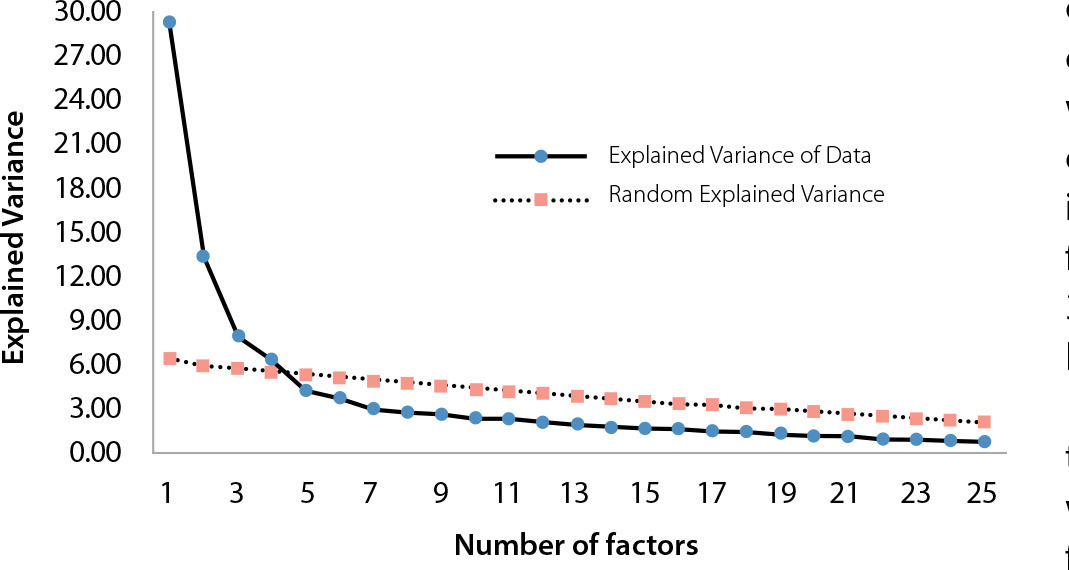
-
ORIGINAL ARTICLE07-29-2024
Nurses’ perspectives on nurses’ work methods
Revista Brasileira de Enfermagem. 2024;77(3):e20230374
Abstract
ORIGINAL ARTICLENurses’ perspectives on nurses’ work methods
Revista Brasileira de Enfermagem. 2024;77(3):e20230374
DOI 10.1590/0034-7167-2023-0374
Views0See moreABSTRACT
Objectives:
To analyze nurses’ perspectives on nurses’ work methods in the hospital context.
Methods:
A descriptive study with a qualitative approach was conducted in a hospital in northern Portugal, involving 17 nurses. Semi-structured interviews were used for data collection. Data collected between May and June 2023 underwent content analysis, supported by Atlas.ti software.
Results:
Three thematic areas emerged: “Nurses’ work methods in a hospital context,” highlighting the conception and components of work methods and the methods in use; “Implementation of nurses’ work methods,” emphasizing influencing factors and challenges to implementation; and “Impact of nurses’ work methods on patients, nurses, and institutions.”
Final Considerations:
Nurses’ work methods constitute the structure of nursing care. Some factors influence and some challenges arise in the implementation of these methods, producing impacts on patients, nurses, and institutions.

-
ORIGINAL ARTICLE07-29-2024
Nursing Process for institutionalized older adults: contributions from knowledge awareness workshop
Revista Brasileira de Enfermagem. 2024;77(3):e20230349
Abstract
ORIGINAL ARTICLENursing Process for institutionalized older adults: contributions from knowledge awareness workshop
Revista Brasileira de Enfermagem. 2024;77(3):e20230349
DOI 10.1590/0034-7167-2023-0349
Views0See moreABSTRACT
Objective:
To analyze the knowledge of professionals working in a Nursing Home about the Nursing Process before and after the awareness workshop.
Methods:
This is strategic action research, developed with nursing professionals and managers of a Nursing Home in Rio Grande do Sul, Brazil. Data were collected between January and June 2023, through semi-structured interviews before and after an awareness workshop. Discursive textual analysis of the data was carried out.
Results:
The central category “Understanding about the Nursing Process in Nursing Homes” emerged, which was unitized into two units of meaning and three categories of analysis.
Conclusion:
Data revealed non-use and lack of knowledge of the Nursing Process before awareness raising. Afterwards, a deeper understanding of the topic and its importance was identified. Awareness-raising workshops contribute to transformation of knowledge.
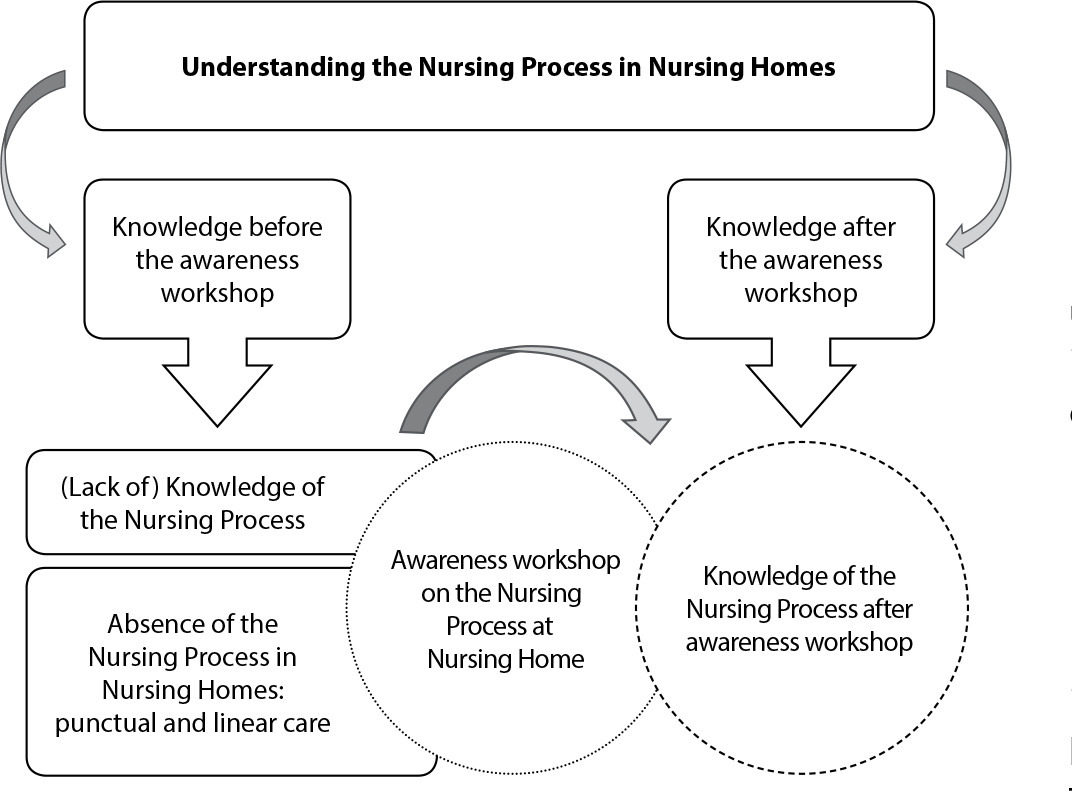
-
ORIGINAL ARTICLE07-29-2024
Excessive daytime sleepiness in nursing technicians: association with sleep quality and memory
Revista Brasileira de Enfermagem. 2024;77(3):e20230332
Abstract
ORIGINAL ARTICLEExcessive daytime sleepiness in nursing technicians: association with sleep quality and memory
Revista Brasileira de Enfermagem. 2024;77(3):e20230332
DOI 10.1590/0034-7167-2023-0332
Views0See moreABSTRACT
Objective:
to investigate excessive daytime sleepiness prevalence among nursing technicians and the association with sleep quality and memory.
Methods:
a cross-sectional, inferential study, carried out in a hospital unit in the state of Goiás between December 2020 and January 2021. Assessments were carried out using the Epworth Sleepiness Scale, the Pittsburgh Sleep Quality Index and the Prospective and Retrospective Memory Questionnaire, instruments validated for the Brazilian context. Bivariate and multivariate logistic regression analyzes were performed.
Results:
the sample consisted of 189 nursing technicians with a 40.9% excessive daytime sleepiness prevalence. In multivariate models, excessive daytime sleepiness was not associated with sleep quality, however there was a significant association with overall memory failures.
Conclusions:
study results demonstrate a high excessive daytime sleepiness occurrence, an association with overall memory failures and the need for psychosocial interventions for nursing technicians.
-
ORIGINAL ARTICLE07-29-2024
Educational technology for multidisciplinary training for managing waiting lists for elective patients
Revista Brasileira de Enfermagem. 2024;77(3):e20230299
Abstract
ORIGINAL ARTICLEEducational technology for multidisciplinary training for managing waiting lists for elective patients
Revista Brasileira de Enfermagem. 2024;77(3):e20230299
DOI 10.1590/0034-7167-2023-0299
Views1See moreABSTRACT
Objectives:
to construct and assess an educational technology for managing patient waiting lists for multidisciplinary training.
Methods:
study supported by Instructional Design – ADDIE model, whose stages of construction of educational technology were developed in the form of a multi-professional training course. Its respective content assessment was carried out by a committee of experts from 2021 to 2022. The analysis occurred based on the proportion of content adequacy with 95% Confidence Interval.
Results:
seventeen products were created as educational technology learning objects: five storyboards; four videos; three comic books; two pedagogical action plans; a mind map; and a YouTube® playlist. Nine experts assessed content adequacy, which reached 0.89.
Conclusions:
this educational technology contributes to the performance of professionals who manage waiting lists by reducing inequalities, alleviating differences, in addition to promoting equity in care and good health for patients in the Brazilian Health System.

-
ORIGINAL ARTICLE07-29-2024
Fuzzy Logic: vulnerability of women who have sex with women to sexually transmitted infections
Revista Brasileira de Enfermagem. 2024;77(3):e20230271
Abstract
ORIGINAL ARTICLEFuzzy Logic: vulnerability of women who have sex with women to sexually transmitted infections
Revista Brasileira de Enfermagem. 2024;77(3):e20230271
DOI 10.1590/0034-7167-2023-0271
Views0See moreABSTRACT
Objective:
To describe the possibility of applying Fuzzy Logic in analyzing the vulnerability of Women Who Have Sex with Women to Sexually Transmitted Infections/HIV/AIDS.
Methods:
We developed a Fuzzy Logic system with 17 input variables and one output variable, using data related to vulnerability in a municipality located in the Midwest region of the State of São Paulo, Brazil.
Results:
The factor with the greatest positive impact was the confirmation that a low understanding of Sexually Transmitted Infections/HIV/AIDS is associated with higher vulnerability. Conversely, the statement “Not disclosing sexual activity to healthcare professionals,” where individuals do not admit to having sex with women, had the least impact.
Conclusions:
Fuzzy Logic facilitates the identification of vulnerability, expressed through the analysis of interaction between variables in each dimension. This makes it a promising method to assist in analyzing the vulnerability of specific populations.
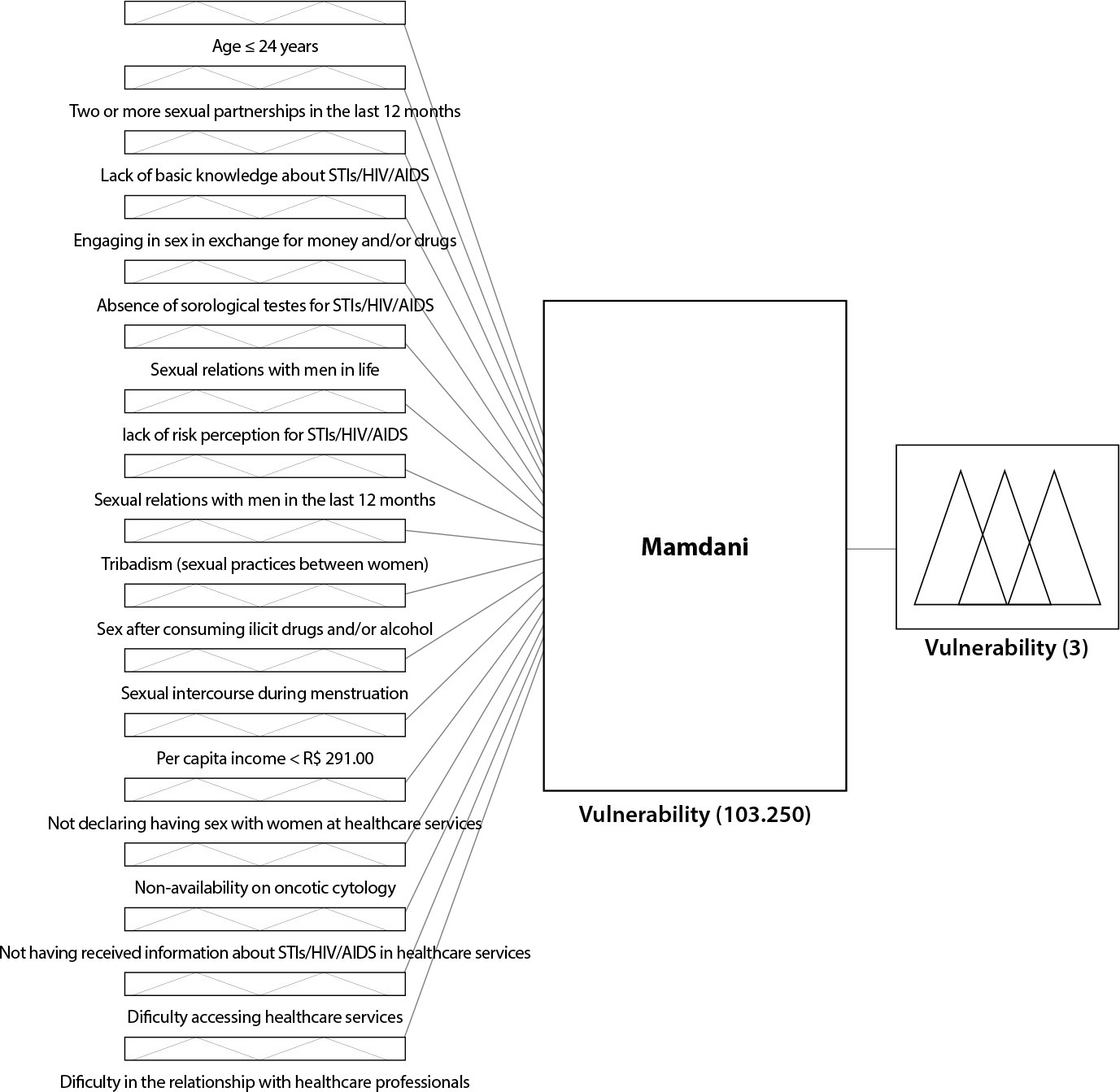
-
ORIGINAL ARTICLE07-29-2024
University Student Depression Inventory, Brazilian Version, Construct Assessment
Revista Brasileira de Enfermagem. 2024;77(3):e20230232
Abstract
ORIGINAL ARTICLEUniversity Student Depression Inventory, Brazilian Version, Construct Assessment
Revista Brasileira de Enfermagem. 2024;77(3):e20230232
DOI 10.1590/0034-7167-2023-0232
Views0See moreABSTRACT
Objectives:
to assess the University Student Depression Inventory, Brazilian version (USDI-BR), construct.
Methods:
a methodological study carried out with a snowball probabilistic sample, consisting of 334 undergraduate and graduate students. Confirmatory factor analysis, reliability using McDonald’s omega coefficient and Cronbach’s alpha were performed. Principal component analysis was performed using the varimax rotation and oblimin rotation, using the Kaiser-Meyer-Olkin criteria, Bartlett’s test of sphericity and scree plot.
Results:
the USDI-BR presented an internal consistency of items of ω = 0.95 and remained with 30 items, with the addition of 1 factor (Death wish and social withdrawal), totaling 4 factors.
Conclusions:
the USDI-BR has evidence that points to its validity and also its internal consistency, deserving that new studies be carried out to expand the evidence of its psychometric properties.
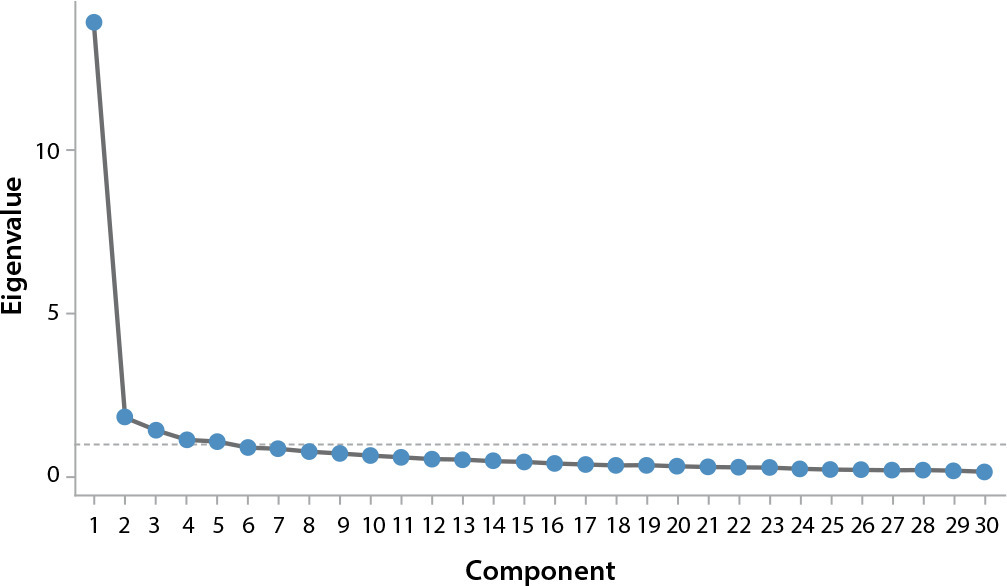
-
ORIGINAL ARTICLE07-29-2024
Family refusal of skin donation for transplantation: trends and associated factors
Revista Brasileira de Enfermagem. 2024;77(3):e20230209
Abstract
ORIGINAL ARTICLEFamily refusal of skin donation for transplantation: trends and associated factors
Revista Brasileira de Enfermagem. 2024;77(3):e20230209
DOI 10.1590/0034-7167-2023-0209
Views0See moreABSTRACT
Objectives:
to analyze the trends and factors associated with family refusal of skin donation for transplantation.
Methods:
this cross-sectional study was conducted in the State of São Paulo, with family authorization terms collected from 2001 to 2020. The variables analyzed included year, age, gender, cause of death, and type of institution. Data were analyzed using linear and multiple logistic regression, with the Odds Ratio estimated at p<0.05 for statistical significance.
Results:
1,355 individuals refused skin donation. The trend of refusals decreased between 2001 and 2009 in the age groups of 0-11 years and 12-19 years, but increased in the group aged ≥60 years. This trend continued to decrease in the 0-11 years group from 2010 to 2020, and increased in the 20-40 years group. Males and the age groups of 20-40 years, 41-59 years, and ≥60 years exhibited 27%, 34%, 47%, and 53% lower chances of refusal, respectively.
Conclusions:
there is an urgent need for measures to mitigate the high number of refusals associated with skin donation.
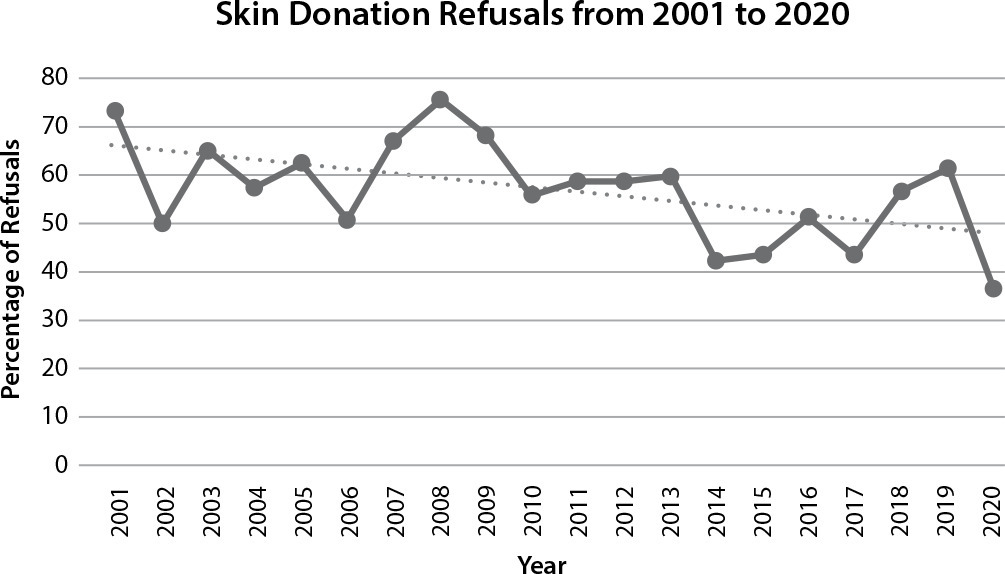
Search
Search in:
Nuvem de Tags
Adolescente (85) Atenção Primária à Saúde (239) COVID-19 (91) Criança (91) Cuidados de Enfermagem (269) Educação em Enfermagem (151) Educação em Saúde (139) Enfermagem (930) Enfermagem Pediátrica (86) Estudantes de Enfermagem (77) Estudos de Validação (131) Família (87) Idoso (208) Promoção da Saúde (99) Qualidade de Vida (104) Saúde do Trabalhador (86) Saúde Mental (145) Saúde Pública (82) Segurança do Paciente (150) Tecnologia Educacional (100)



